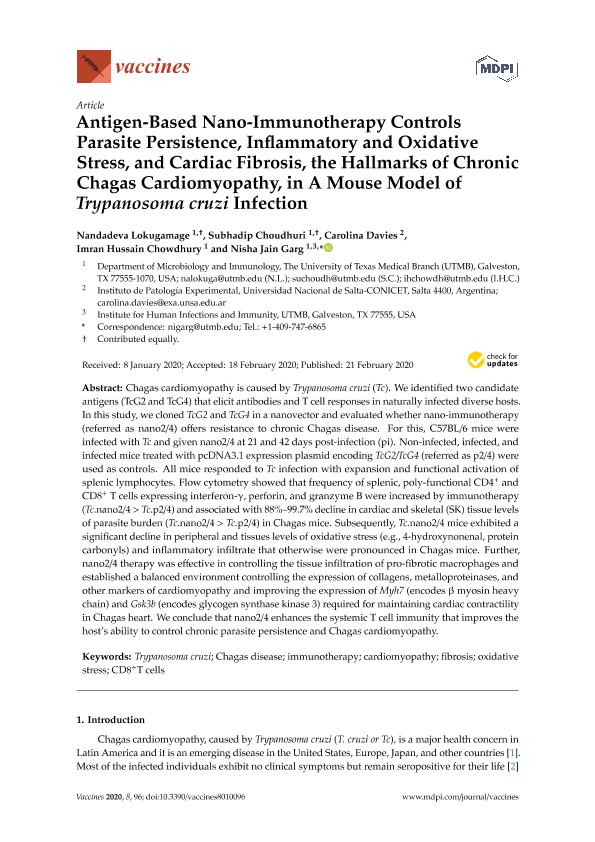Mostrar el registro sencillo del ítem
dc.contributor.author
Lokugamage, Nandadeva
dc.contributor.author
Choudhuri, Subhadip
dc.contributor.author
Davies, Carolina

dc.contributor.author
Chowdhury, Imran Hussain
dc.contributor.author
Garg, Nisha Jain

dc.date.available
2021-03-18T17:30:15Z
dc.date.issued
2020-02-21
dc.identifier.citation
Lokugamage, Nandadeva; Choudhuri, Subhadip; Davies, Carolina; Chowdhury, Imran Hussain; Garg, Nisha Jain; Antigen-based nano-immunotherapy controls parasite persistence, inflammatory and oxidative stress, and cardiac fibrosis, the hallmarks of chronic chagas cardiomyopathy, in a mouse model of trypanosoma cruzi infection; Multidisciplinary Digital Publishing Institute; Vaccines; 8; 1; 21-2-2020; 1-21
dc.identifier.issn
2076-393X
dc.identifier.uri
http://hdl.handle.net/11336/128557
dc.description.abstract
Chagas cardiomyopathy is caused by Trypanosoma cruzi (Tc). We identified two candidate antigens (TcG2 and TcG4) that elicit antibodies and T cell responses in naturally infected diverse hosts. In this study, we cloned TcG2 and TcG4 in a nanovector and evaluated whether nano-immunotherapy (referred as nano2/4) offers resistance to chronic Chagas disease. For this, C57BL/6 mice were infected with Tc and given nano2/4 at 21 and 42 days post-infection (pi). Non-infected, infected, and infected mice treated with pcDNA3.1 expression plasmid encoding TcG2/TcG4 (referred as p2/4) were used as controls. All mice responded to Tc infection with expansion and functional activation of splenic lymphocytes. Flow cytometry showed that frequency of splenic, poly-functional CD4+ and CD8+ T cells expressing interferon-γ, perforin, and granzyme B were increased by immunotherapy (Tc.nano2/4 > Tc.p2/4) and associated with 88%–99.7% decline in cardiac and skeletal (SK) tissue levels of parasite burden (Tc.nano2/4 > Tc.p2/4) in Chagas mice. Subsequently, Tc.nano2/4 mice exhibited a significant decline in peripheral and tissues levels of oxidative stress (e.g., 4-hydroxynonenal, protein carbonyls) and inflammatory infiltrate that otherwise were pronounced in Chagas mice. Further, nano2/4 therapy was effective in controlling the tissue infiltration of pro-fibrotic macrophages and established a balanced environment controlling the expression of collagens, metalloproteinases, and other markers of cardiomyopathy and improving the expression of Myh7 (encodes β myosin heavy chain) and Gsk3b (encodes glycogen synthase kinase 3) required for maintaining cardiac contractility in Chagas heart. We conclude that nano2/4 enhances the systemic T cell immunity that improves the host’s ability to control chronic parasite persistence and Chagas cardiomyopathy.
dc.format
application/pdf
dc.language.iso
eng
dc.publisher
Multidisciplinary Digital Publishing Institute
dc.rights
info:eu-repo/semantics/openAccess
dc.rights.uri
https://creativecommons.org/licenses/by/2.5/ar/
dc.subject
CARDIOMYOPATHY
dc.subject
CD8+T CELLS
dc.subject
CHAGAS DISEASE
dc.subject
FIBROSIS
dc.subject
IMMUNOTHERAPY
dc.subject
OXIDATIVE STRESS
dc.subject
TRYPANOSOMA CRUZI
dc.subject.classification
Parasitología

dc.subject.classification
Ciencias de la Salud

dc.subject.classification
CIENCIAS MÉDICAS Y DE LA SALUD

dc.title
Antigen-based nano-immunotherapy controls parasite persistence, inflammatory and oxidative stress, and cardiac fibrosis, the hallmarks of chronic chagas cardiomyopathy, in a mouse model of trypanosoma cruzi infection
dc.type
info:eu-repo/semantics/article
dc.type
info:ar-repo/semantics/artículo
dc.type
info:eu-repo/semantics/publishedVersion
dc.date.updated
2021-01-27T19:56:09Z
dc.journal.volume
8
dc.journal.number
1
dc.journal.pagination
1-21
dc.journal.pais
Estados Unidos

dc.description.fil
Fil: Lokugamage, Nandadeva. University of Texas Medical Branch; Estados Unidos
dc.description.fil
Fil: Choudhuri, Subhadip. University of Texas Medical Branch; Estados Unidos
dc.description.fil
Fil: Davies, Carolina. Consejo Nacional de Investigaciones Científicas y Técnicas. Centro Científico Tecnológico Conicet - Salta. Instituto de Patología Experimental. Universidad Nacional de Salta. Facultad de Ciencias de la Salud. Instituto de Patología Experimental; Argentina
dc.description.fil
Fil: Chowdhury, Imran Hussain. University of Texas Medical Branch; Estados Unidos
dc.description.fil
Fil: Garg, Nisha Jain. University of Texas Medical Branch; Estados Unidos
dc.journal.title
Vaccines
dc.relation.alternativeid
info:eu-repo/semantics/altIdentifier/doi/http://dx.doi.org/10.3390/vaccines8010096
dc.relation.alternativeid
info:eu-repo/semantics/altIdentifier/url/https://www.mdpi.com/2076-393X/8/1/96
Archivos asociados
